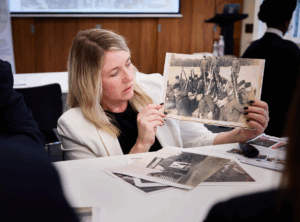Published in 2016, this study remains the largest of its kind ever conducted in the world. More than 9,500 young people aged 11-18 years across England contributed to the study by participating in pilot studies, completing a comprehensive survey and sharing their views in focus groups.
Overall, the research found that despite the mandatory status of the Holocaust within the National Curriculum, student knowledge and conceptual understanding was often limited and based on inaccuracies and misconceptions, including:
- The majority of students knew Jews were the primary victims of the Holocaust, but most had little understanding of why they were persecuted and murdered. Over two thirds of students (68%) were unaware of what ‘antisemitism’ meant.
- Students’ ideas of perpetration and complicity were oversimplified: 56% of students in Years 7–9 believed Hitler was solely responsible. This misconception typically prevented them from seeing genocide as a societal crime and limited their ability to make connections with issues in our contemporary world.
- Half of students incorrectly believed that the largest number of Jews murdered during the Holocaust came from Germany and 54.9 per cent thought that mass murder took place in Germany, not German-occupied Poland. For many students the Holocaust was seen through a distinctively Hitler-centric and German-centric lens.
- Most students had limited understanding of the Holocaust and its relationship to the Second World War.
- Students were typically ill-informed about the British government’s response to the Holocaust and unable to critically evaluate Britain’s relationship to the genocide.
The impact of this study has been significant, including:
- Being cited extensively in the Prime Minister’s 2015 Holocaust Commission Report, Britain’s Promise to Remember
- Informing the creation of the UCL Centre for Holocaust Education’s ground-breaking school textbook, Understanding the Holocaust: How and why did it happen?
- Informing content produced by specialists at the UCL Centre for Holocaust Education, as part of the OSCE Office for Democratic Institutions and Human Rights (ODIHR) and UNESCO’s major international publication, Addressing Anti-Semitism in Schools: Training Curricula
The Centre’s approach has always been led by what is happening in the classroom. Ongoing research with students and teachers means we are uniquely responsive to their needs. Our teacher development programmes and educational resources address key issues, including those identified in the 2016 study with students. We have developed a series of downloadable research briefings to provide guidance for how teachers can use this research to inform their practice.



